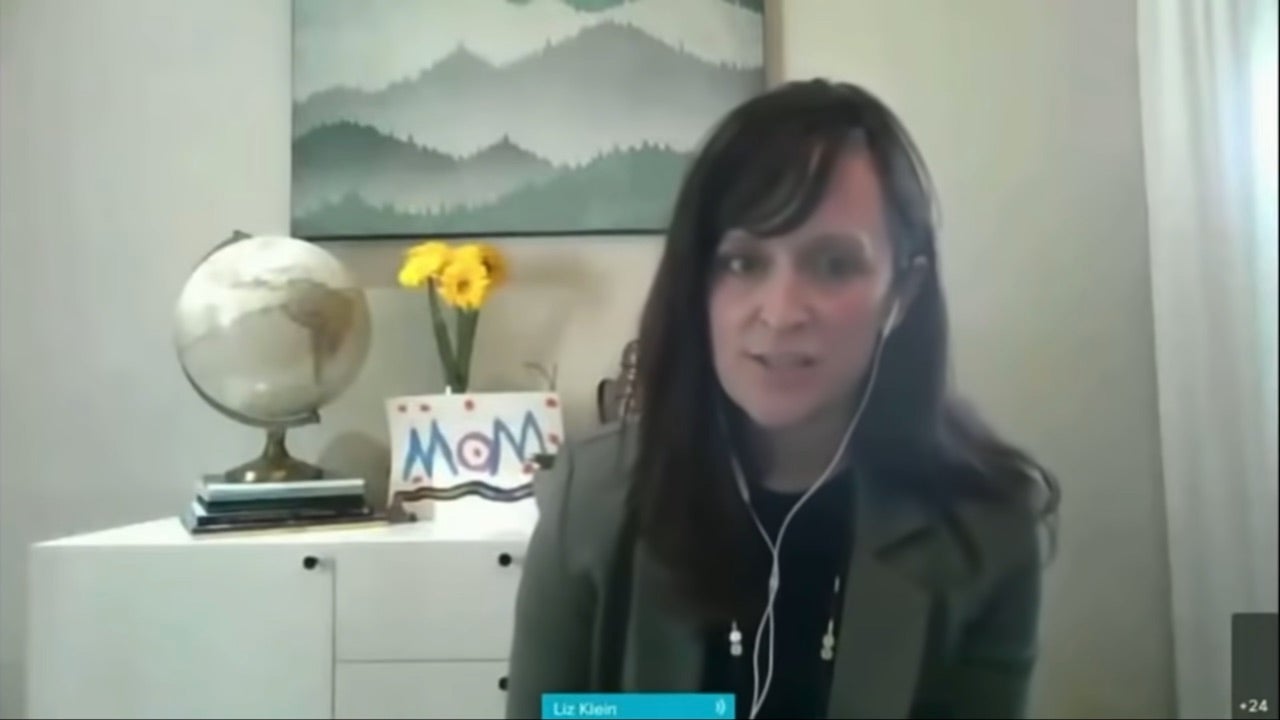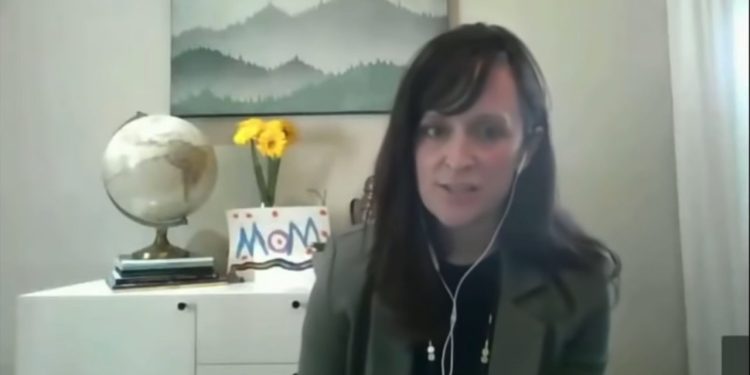
The Biden administration announced this week that Elizabeth Klein, an official with a history of climate activism, as the new director of the Bureau of Ocean Energy Management (BOEM).
In its announcement, the Department of the Interior (DOI), which oversees BOEM, lauded Klein — who joined the administration as a senior counselor to Interior Secretary Deb Haaland in 2021 after the Senate failed to confirm her as the agency’s second in command — for her experience as an attorney specializing in clean energy, climate change and environmental law and policy.
‘Liz has been an invaluable asset at the Department since Day One, and we are thrilled she is taking on this new role,’ DOI Chief of Staff Rachael Taylor said in a statement. ‘The Interior Department is leading the effort to foster a clean energy future, and Liz will be critical to our efforts.’
The White House, though, withdrew Klein’s nomination for DOI deputy secretary after facing pushback regarding her potential conflicts of interest and concerns from Sen. Lisa Murkowski, R-Alaska, Politico reported in March 2021. The action marked the second time one of President Biden’s nominations fell through after Neera Tanden’s nomination to lead the Office of Management and Budget was withdrawn.
Klein previously worked at the National Park Foundation, law firm Latham & Watkins and the DOI in several positions during the Obama administration. But her most recent role as the deputy director of the State Energy & Environmental Impact Center (SEEIC) based at the NYU School of Law, where she worked for more than three years, sparked ethics concerns among Republican lawmakers.
The SEEIC — founded in 2017 with the help of a multimillion-dollar grant from billionaire former Democratic presidential candidate Michael Bloomberg — supports attorneys general nationwide by providing fellows to serve as special assistants for clean energy, climate and environmental matters. As deputy director of the center, Klein helped place fellows in high-ranking state-level positions where they helped steer climate litigation.
While the center has characterized its work as nonpartisan, it has placed its fellows in the offices of solely Democratic state attorneys general. The fellows, which are paid exclusively by the center, have worked on climate issues for attorneys general in Massachusetts, New York, Oregon, Washington D.C. and at least six other states. Several of the attorneys general involved in the scheme have filed high-profile legal challenges against Big Oil companies for allegedly pushing a climate disinformation campaign.
A fellowship agreement between the SEEIC and the Minnesota attorney general’s office reviewed by Fox News Digital states that a legal fellow placed at the office would be employed by the center, not the state. The agreement, which was obtained by Climate Litigation Watch in 2020, listed Klein as the program’s point of contact.
Overall, SEEIC legal fellows were involved in at least 130 legal challenges related to federal climate policies between 2017 and 2018, according to a review by Real Clear Investigations. Since then, the center has taken credit for dozens more challenges from attorneys general pushing back on both Trump and Biden administration policies including those related to oil and gas drilling.
In 2021, Republicans expressed concern that Klein would be involved with various issues at the DOI which SEEIC fellows had been involved in via various court cases. Reps. Bruce Westerman, R-Ark., the current chairman of the House Natural Resources Committee, Paul Gosar, R-Ariz., and Lauren Boebert, R-Colo., warned that Klein’s past position represented a potential conflict of interest.
The Biden administration ethics pledge includes a ‘revolving door ban’ which prohibits officials from participating ‘in any particular matter’ involving parties directly and substantially related to their former employer.
‘As Senior Counselor to the Secretary, Ms. Klein is subject to President Biden’s ethics standards,’ Westerman and the other lawmakers wrote to Klein and the top DOI ethics officer on June 3. ‘Under these standards, Ms. Klein’s participation in the decision-making process for any issue related to the specific regulatory or legal challenges advocated by SEEIC fellows she placed in state attorneys general offices is questionable at best.’
After the DOI provided some of the requested documents, the GOP lawmakers sent a follow-up letter later that month again requesting Klein’s recusal list and ethics guidance that the agency failed to provide.
A spokesperson for Westerman told Fox News Digital on Thursday that, in his role as chair of the committee, the congressman would likely to seek more information from the administration regarding Klein’s role and potential conflicts of interest.
‘The White House pulled your potential nomination to be the the deputy secretary because your conflicts of interest were so severe that you faced bipartisan opposition,’ Boebert said to Klein during a House hearing in 2021.
‘I take my ethics obligations at the Department of Interior seriously,’ Klein responded after Boebert asked about her work with SEEIC. ‘I work closely with our ethics officials to make sure I abide by my recusal responsibilities.’
In response to her comments, Boebert said Klein was a ‘extremist partisan hack.’
When asked about Klein’s work with the SEEIC and the concerns lawmakers have expressed about her, a DOI spokesperson told Fox News Digital that the agency maintained its ‘full throated support’ for Klein. The spokesperson also noted that the DOI responded to Westerman’s inquiry in 2021.
Klein’s appointment to lead BOEM puts her in one of the top energy policymaking positions in the federal government. In the role, she will lead the agency’s work developing and approving offshore energy projects including both wind projects and fossil fuel drilling.
Klein, who is set to take over for current BOEM Director Amanda Lefton on Jan. 19, will immediately be thrust into a major decision-making process regarding a plan for future offshore oil and gas drilling. BOEM is currently developing a five-year leasing plan which could include as many as 11 lease sales or as few as zero through 2028.
‘We find it very interesting that Ms. Klein, who was unable to attain Senate confirmation to Deputy Secretary two years ago, was named to head one of the Department’s top energy posts, one which does not require Senate confirmation,’ government watchdog group Protect the Public’s Trust said in a statement. ‘Her history as a fervent opponent of oil and gas drilling hardly qualifies her as a neutral arbiter to develop our nation’s offshore resources.’
‘Protect the Public’s Trust and others still have a raft of unanswered questions regarding her ethics documents and her participation in matters involving her former clients while she was at the controversial Bloomberg-funded State Energy and Environmental Impact Center, which placed ‘fellows’ at state Attorneys General offices around the country to lead lawsuits against Interior and other government agencies,’ the group added.
‘While the Biden Administration continually touts itself as the most ethical in history, this represents yet another example in which ethics takes a backseat to policy and politics,’ PPT continued in its statement.
The White House and SEEIC didn’t respond to requests for comment.

The Biden administration announced this week that Elizabeth Klein, an official with a history of climate activism, as the new director of the Bureau of Ocean Energy Management (BOEM).
In its announcement, the Department of the Interior (DOI), which oversees BOEM, lauded Klein — who joined the administration as a senior counselor to Interior Secretary Deb Haaland in 2021 after the Senate failed to confirm her as the agency’s second in command — for her experience as an attorney specializing in clean energy, climate change and environmental law and policy.
‘Liz has been an invaluable asset at the Department since Day One, and we are thrilled she is taking on this new role,’ DOI Chief of Staff Rachael Taylor said in a statement. ‘The Interior Department is leading the effort to foster a clean energy future, and Liz will be critical to our efforts.’
The White House, though, withdrew Klein’s nomination for DOI deputy secretary after facing pushback regarding her potential conflicts of interest and concerns from Sen. Lisa Murkowski, R-Alaska, Politico reported in March 2021. The action marked the second time one of President Biden’s nominations fell through after Neera Tanden’s nomination to lead the Office of Management and Budget was withdrawn.
Klein previously worked at the National Park Foundation, law firm Latham & Watkins and the DOI in several positions during the Obama administration. But her most recent role as the deputy director of the State Energy & Environmental Impact Center (SEEIC) based at the NYU School of Law, where she worked for more than three years, sparked ethics concerns among Republican lawmakers.
The SEEIC — founded in 2017 with the help of a multimillion-dollar grant from billionaire former Democratic presidential candidate Michael Bloomberg — supports attorneys general nationwide by providing fellows to serve as special assistants for clean energy, climate and environmental matters. As deputy director of the center, Klein helped place fellows in high-ranking state-level positions where they helped steer climate litigation.
While the center has characterized its work as nonpartisan, it has placed its fellows in the offices of solely Democratic state attorneys general. The fellows, which are paid exclusively by the center, have worked on climate issues for attorneys general in Massachusetts, New York, Oregon, Washington D.C. and at least six other states. Several of the attorneys general involved in the scheme have filed high-profile legal challenges against Big Oil companies for allegedly pushing a climate disinformation campaign.
A fellowship agreement between the SEEIC and the Minnesota attorney general’s office reviewed by Fox News Digital states that a legal fellow placed at the office would be employed by the center, not the state. The agreement, which was obtained by Climate Litigation Watch in 2020, listed Klein as the program’s point of contact.
Overall, SEEIC legal fellows were involved in at least 130 legal challenges related to federal climate policies between 2017 and 2018, according to a review by Real Clear Investigations. Since then, the center has taken credit for dozens more challenges from attorneys general pushing back on both Trump and Biden administration policies including those related to oil and gas drilling.
In 2021, Republicans expressed concern that Klein would be involved with various issues at the DOI which SEEIC fellows had been involved in via various court cases. Reps. Bruce Westerman, R-Ark., the current chairman of the House Natural Resources Committee, Paul Gosar, R-Ariz., and Lauren Boebert, R-Colo., warned that Klein’s past position represented a potential conflict of interest.
The Biden administration ethics pledge includes a ‘revolving door ban’ which prohibits officials from participating ‘in any particular matter’ involving parties directly and substantially related to their former employer.
‘As Senior Counselor to the Secretary, Ms. Klein is subject to President Biden’s ethics standards,’ Westerman and the other lawmakers wrote to Klein and the top DOI ethics officer on June 3. ‘Under these standards, Ms. Klein’s participation in the decision-making process for any issue related to the specific regulatory or legal challenges advocated by SEEIC fellows she placed in state attorneys general offices is questionable at best.’
After the DOI provided some of the requested documents, the GOP lawmakers sent a follow-up letter later that month again requesting Klein’s recusal list and ethics guidance that the agency failed to provide.
A spokesperson for Westerman told Fox News Digital on Thursday that, in his role as chair of the committee, the congressman would likely to seek more information from the administration regarding Klein’s role and potential conflicts of interest.
‘The White House pulled your potential nomination to be the the deputy secretary because your conflicts of interest were so severe that you faced bipartisan opposition,’ Boebert said to Klein during a House hearing in 2021.
‘I take my ethics obligations at the Department of Interior seriously,’ Klein responded after Boebert asked about her work with SEEIC. ‘I work closely with our ethics officials to make sure I abide by my recusal responsibilities.’
In response to her comments, Boebert said Klein was a ‘extremist partisan hack.’
When asked about Klein’s work with the SEEIC and the concerns lawmakers have expressed about her, a DOI spokesperson told Fox News Digital that the agency maintained its ‘full throated support’ for Klein. The spokesperson also noted that the DOI responded to Westerman’s inquiry in 2021.
Klein’s appointment to lead BOEM puts her in one of the top energy policymaking positions in the federal government. In the role, she will lead the agency’s work developing and approving offshore energy projects including both wind projects and fossil fuel drilling.
Klein, who is set to take over for current BOEM Director Amanda Lefton on Jan. 19, will immediately be thrust into a major decision-making process regarding a plan for future offshore oil and gas drilling. BOEM is currently developing a five-year leasing plan which could include as many as 11 lease sales or as few as zero through 2028.
‘We find it very interesting that Ms. Klein, who was unable to attain Senate confirmation to Deputy Secretary two years ago, was named to head one of the Department’s top energy posts, one which does not require Senate confirmation,’ government watchdog group Protect the Public’s Trust said in a statement. ‘Her history as a fervent opponent of oil and gas drilling hardly qualifies her as a neutral arbiter to develop our nation’s offshore resources.’
‘Protect the Public’s Trust and others still have a raft of unanswered questions regarding her ethics documents and her participation in matters involving her former clients while she was at the controversial Bloomberg-funded State Energy and Environmental Impact Center, which placed ‘fellows’ at state Attorneys General offices around the country to lead lawsuits against Interior and other government agencies,’ the group added.
‘While the Biden Administration continually touts itself as the most ethical in history, this represents yet another example in which ethics takes a backseat to policy and politics,’ PPT continued in its statement.
The White House and SEEIC didn’t respond to requests for comment.
















